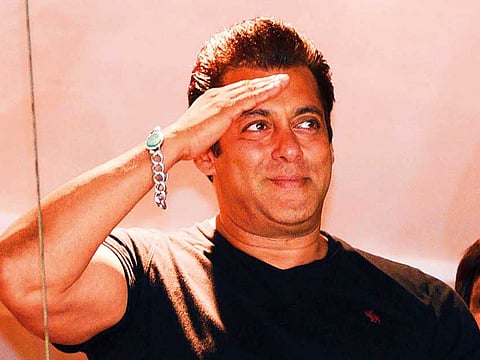Crime, punishment and justice in India
Bollywood star Salman Khan should be awarded community service and he must be ordered to fund new wildlife reserves

Seemingly every couple of years or so, Salman Khan, one of India’s most successful stars, makes his muscle-bound appearance in a court of law for the alleged killing of two blackbucks — a protected species — among other assorted acts of commission and omission.
The blackbuck incident took place in 1998, in a forest in Rajasthan. There were other film stars with him on that night; among them, Saif Ali Khan, Tabu, Neelam Kothari and Sonali Bendre. But since Khan alone pulled the trigger, he has been in and out of courts. Ever since, the ghosts of the blackbucks have been haunting him.
He has had other cases against him. According to reports, on October 1998, the police had filed a case against Khan for illegal possession of a rifle and a revolver, one of which he had apparently used to hunt the blackbucks with. He had also allegedly killed a chinkara (Indian gazelle), another endangered species. The poaching took place on the nights of October 1 and 2 of 1998.
A few years later, in 2002, Khan drove his SUV over a pavement dweller in Bandra, an upmarket area of Mumbai, where film stars tend to flock and reside. This case dragged on till in 2015, when the Bombay High Court acquitted him of all charges. There were allegations that the defence tried to buy witnesses, not to mention the officials concerned.
The chinkara case ended with the court again acquitting Khan in January 2017. The files regarding the case were found to be missing, and there were cartoons doing the rounds of the antelopes committing suicide by means of a gun.
It is not as if Khan did not do time in jail. In between trials and bails, he spent weeks in jail in April 2006, and then again in August 2007.
Last week he spent two nights in a Jodhpur jail, before getting bail. Once he got it, he flew to Bombay in a chartered flight from Jodhpur. The policemen accompanying him to Jodhpur airport seemed proud to be part of Khan’s history of footnotes. Which proves Khan’s correctional history has had no impact on anyone, least of all the cops, the guardians of the law.
Khan is free to go in appeal, and a month from now the court would examine the grounds for the suspension of the 5-year-sentence awarded to him for killing the blackbucks.
Incidentally, the the Jodhpur sessions court judge who found Khan guilty was transferred, as befitting a Bollywood drama, to another district the same day he delivered the judgement.
The transfer could not have been completely innocent as very few things in India, contrary to the chaos perceived as presiding over the proceedings, are not politically designed. Just as the missing files that in effect led to Khan’s acquittal in one of the cases, big money is likely to have changed hands. I find all the three cases, blackbucks, chinkara, hit and run, proof of the poverty of the imagination of Indian judges.
The regular argument used by Punish-Salman advocates is that Khan is an icon and that he therefore should be an example for others. But it is not clear to me what exactly is being achieved by sending Khan behind bars.
The thing to do would be to put Khan’s fame and money to good use. Award him perhaps community service. Make him take care of the Bishnoi community, a group of people who believe the chinkaras to be sacred. Build them a college or a hospital. Get him to fund a wildlife preserve.
Take care of slum dwellers of Mumbai; build a shelter for squatters and pavement dwellers. Get Khan to spread awareness against poaching, and drink-driving (a skill he was famous for till the hit-and-run incident happened).
Why the charade?
He would be in good company as it were. International celebrities like Chris Brown, Naomi Campbell, Boy George, and Lindsay Lohan have all done community service to expiate their sins. It is not as if Khan is the only wildlife poacher in India. And that night in 1998 won’t be the last time a blackbuck or two is shot. But Indian judiciary is a strange, slow and dull beast. Most judges tend to think on terms of safe sentences. Quite a few of them practise justice with media-play in mind.
In all likelihood, as it happened in the other two cases Khan will be found innocent eventually. Why then go through this charade? Surely, the best way of paying respect to the memory of the shot (and surely eaten?) blackbucks would be to help them and their favourite Bishnoi community to thrive. There is punishment and then there is justice. One of these days, the Indian legal system must find out the latter is a more rewarding programme for the wronged.
C.P. Surendran is a senior journalist based in India.


